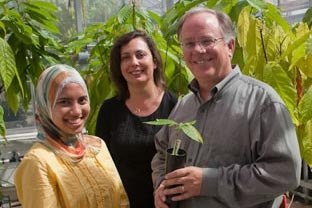
Drs. Guiltinan and Maximova teach courses in Plant Biotechnology, Plant Biology and Supervise Undergraduate and Graduate research projects
Drs. Guiltinan and Maximova teach courses in Plant Biotechnology, Plant Biology and Supervise Undergraduate and Graduate research projects.
They also provide training to scientists from around the world through international scientific exchange visits and technical workshops.
Current Courses
Current Issues in Agricultural Innovation - AEPS 502
Every two years: next class Fall 2023g
AEPS 502, Section 001: Issues in Ag Innovation (22181--UP---P-AEPS----502-------001-)
Class Number 27213 - Units 2 units - Instruction Mode In Person
Course ID - 303550 Class Capacity 15
Dates 8/23/2021 - 12/10/2021 - University Park Campus
Instructor: Mark Guiltinan.
Email: mjg9@psu.edu
Office: 422 Life Sciences Building
2 credits: The course will provide (1) hours of SARI credit to students in plant science related fields. No prerequisites, no required text books.
Summary Current Issues in Agricultural Innovation was designed to expose students to a broad overview of modern agricultural research topics and to consider how Scientific, Ethical, Legal and Social Issues impact their adoption. In this class, we will explore how modern agricultural technologies, particularly those related to cropping systems and plant-based foods, can provide substantial economic and nutritional benefits, while simultaneously reducing risks to the environment and human health generated by agricultural practices. We will also explore the risks of agricultural innovations and potential problems associated with them. Agriculture research and science innovation often intersect with ethical considerations and this theme will be one of the main topics and also dispersed throughout each of the class meetings. We will examine the social dimensions of scientific research and technology development. This includes reading and discussing work on how social contexts influence scientific research and technology diffusion, on variations among the public and experts on perceptions of research and technology risks, on differences between public and private research institutions and on validity and integrity in regulatory systems.
Independent Undergraduate Research - Hort/Biol 296/496
Undergraduate students performing state of the art research with graduate students and postdoctoral associates in plant molecular biology.
Previous Courses
Plant Biotechnology - Hort/Biotech/Biol 459
Plant Biotechnology is a rapidly growing field of science that has impacted our society on many different levels. The future of plant biotechnology has the potential to contribute immensely to many of our societies most pressing problems, but its future is in question because of socio-economic and political forces. This class will provide a strong overview of the techniques used in plant biotechnology, and the applications made possible by it. We will produce transgenic plants in lab, and these will be used to illustrate many of the most important tools of the biotechnologist. We will examine various aspects regarding the safety, legal and ethical issues surrounding GMOs and study the anti-GMO arguments surrounding each of them. The course will give you a broader and deeper knowledge in the field of Plant Biotechnology, and provide you with a foundation for understanding the field as it changes in the future.
Course Objectives
- To introduce the underlying principles of aseptic culture of plant cells, tissues and organs.
- To provide information about the equipment, procedures and terminology of aseptic culture and experience using them, through student participation in the laboratory.
- To review specialized cell culture techniques and their uses in plant science research and industry.
- To familiarize students with the technology of plant genetic engineering.
- To learn about the social, ethical and legal implications of Plant Biotechnology
Plant Resource Acquisition and Utilization - PLBIO 512
Team Taught: Dr. Guiltinan teaches a module on basic philosophies of the scientific method and scientific discovery. Discussion based lectures on starch biosynthesis and starch branching enzyme research performed in his lab.
USDA Cacao DNA Fingerprinting Ring Test: Results from Penn State University

